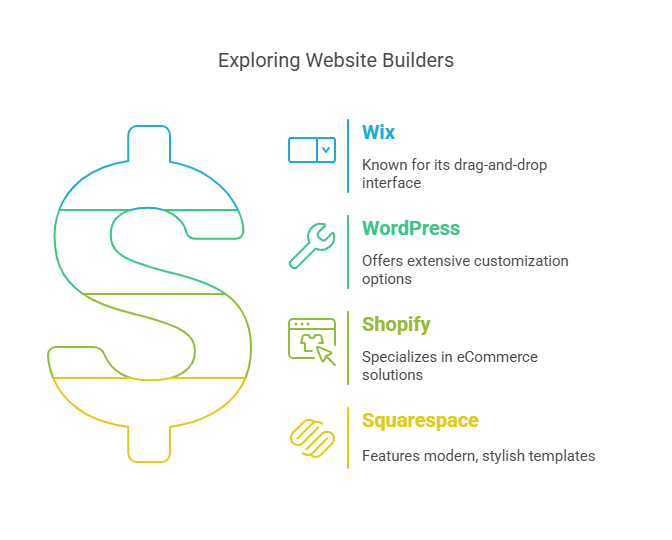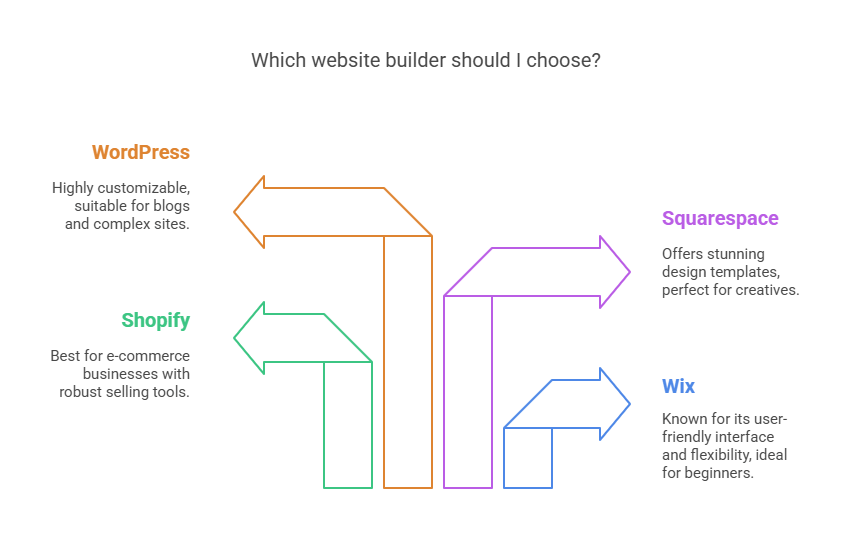
Creating a website has never been easier, thanks to the best website builders available today. Whether you’re an entrepreneur, freelancer, or small business owner, having an online presence is essential. But with so many options, choosing the right website builder can feel overwhelming.
This guide will help you explore the best website builders by breaking down their features, pricing, and ease of use so you can make an informed decision.

Criteria for Evaluating Website Builders
Before selecting from the best website builders, consider these key factors:
- Ease of Use —The best website builders should offer drag-and-drop functionality, pre-designed templates, and an intuitive interface, making it easy for beginners to use.
- Design Flexibility – Customization options matter. A good website builder should allow you to modify layouts, fonts, and colors to match your brand identity.
- Pricing – Whether you need a free option or a premium plan, the best website builders should provide good value without hidden costs.
- Features and Functionalities – Look for built-in SEO tools, e-commerce capabilities, blogging support, and integrations with third-party services.
- Customer Support – Reliable customer support is crucial. The best website builders offer 24/7 assistance via live chat, email, or phone to help with any issues.
Top Website Builders of 2025
Selecting the best website builder is essential for establishing a strong online presence. Below is an overview of some of the top website builders in 2025:

Wix
Wix is renowned for its versatility and user-friendly interface, making it a top choice for both beginners and professionals. It offers a wide array of templates and drag-and-drop functionality, allowing users to create customized websites without coding knowledge.
- Strengths:
- Ease of Use: Wix’s intuitive design tools make website creation accessible to users with varying levels of technical expertise.
- Design Flexibility: With hundreds of templates and extensive customization options, users can create unique websites tailored to their specific needs.
- Features: Offers robust SEO tools, e-commerce capabilities, and a comprehensive app market to extend website functionality.
- Weaknesses:
- Pricing: While Wix offers a free plan, advanced features require a premium subscription, which can become costly depending on the selected plan.
- Performance: Some users have reported slower load times on complex sites with numerous features.
- Ideal Use Cases: Wix is suitable for small businesses, portfolios, blogs, and e-commerce sites seeking a balance between functionality and ease of use.
Squarespace
Squarespace is acclaimed for its sleek, professional templates and robust blogging capabilities. It caters to users who prioritize design aesthetics and content presentation.
- Strengths:
- Design Quality: Offers high-quality, visually appealing templates that are responsive across devices.
- Built-in Features: Provides integrated e-commerce, blogging, and analytics tools, eliminating the need for third-party integrations.
- Customer Support: Known for reliable customer service, including tutorials and 24/7 support channels.Wikipedia+5TechRadar+5TechRadar+5
- Weaknesses:
- Learning Curve: Some users may find the interface less intuitive initially, requiring time to fully grasp its features.
- Pricing: Higher cost compared to some competitors, with no free plan available.
- Ideal Use Cases: Best suited for creatives, bloggers, and businesses that emphasize design and content quality.
Hostinger Website Builder
Hostinger’s website builder is recognized for its affordability and AI-powered tools, making it an attractive option for users seeking cost-effective solutions without compromising on features.
- Strengths:
- Affordability: Offers competitive pricing plans, making it accessible to a wide range of users.
- AI Tools: Incorporates artificial intelligence to assist in website design and optimization, streamlining the creation process.Wikipedia
- Performance: Known for fast load times and reliable uptime, enhancing user experience.
- Weaknesses:
- Design Limitations: While functional, the design templates may not be as polished or diverse as those offered by competitors.
- Feature Set: May lack some advanced features found in other builders, depending on the user’s needs.
- Ideal Use Cases: Ideal for startups, small businesses, and individuals seeking an affordable, straightforward website solution.
Shopify
Shopify is a leading e-commerce platform, providing comprehensive tools for businesses to set up and manage online stores effectively.
- Strengths:
- E-commerce Focus: Designed specifically for online retail, offering extensive e-commerce features like inventory management, payment processing, and shipping integrations.Expert Market
- Scalability: Supports businesses of all sizes, from small startups to large enterprises, with scalable solutions.
- App Ecosystem: Access to a vast array of apps and integrations to extend store functionality.
- Weaknesses:
- Cost: Higher pricing plans, especially when adding premium apps and features.
- Complexity: May require a learning curve for users unfamiliar with e-commerce platforms.
- Ideal Use Cases: Tailored for businesses focused on selling products online, requiring robust e-commerce capabilities.
GoDaddy Website Builder
GoDaddy’s website builder, known as Websites + Marketing, combines website creation tools with marketing features, aiming to provide an all-in-one solution for businesses.PCMAG + 1 TechRadar + 1
- Strengths:
- Speed: Enables quick website setup with its intuitive design and pre-built templates.
- Marketing Integration: Offers built-in marketing and SEO tools to enhance online visibility.
- Customer Support: Provides 24/7 customer service, assisting users at any stage of website development.
- Weaknesses:
- Customization: Limited design flexibility compared to other builders, which may restrict creative control.
- Feature Depth: Some advanced features may require additional costs or are not as comprehensive as those offered by competitors.
- Ideal Use Cases: Suitable for small businesses and individuals seeking a quick, integrated solution for establishing an online presence.
Comparative Analysis of the Best Website Builders
With so many website builders available, it can be challenging to decide which one suits your needs best. Below is a detailed comparison of the best website builders, focusing on essential factors like ease of use, design flexibility, pricing, features, and ideal use cases.
4.1 Feature Comparison Table
| Feature | Wix | Squarespace | Hostinger Website Builder | Shopify | GoDaddy Website Builder |
|---|---|---|---|---|---|
| Ease of Use | Highly intuitive, drag-and-drop | User-friendly but takes time to master | Simple, AI-powered setup | Designed for e-commerce, has a learning curve | Quick and easy setup |
| Design Flexibility | Hundreds of templates, full customization | Sleek, professional templates but less flexible | Basic customization options | Limited to store themes with some editing options | Limited customization |
| Pricing | Free plan; Premium from $17/month | No free plan; Premium from $16/month | Affordable plans, starting at $2.99/month | Starts at $39/month | Plans start at $9.99/month |
| E-commerce Features | Basic online store tools | Good for small online shops | Basic e-commerce support | Full-fledged e-commerce platform with inventory, payment processing, and more | Basic e-commerce for small businesses |
| SEO & Marketing Tools | Strong SEO and marketing integrations | Built-in SEO and email marketing | SEO-friendly but limited marketing tools | Advanced SEO and marketing integrations | Basic SEO and email marketing |
| Customer Support | 24/7 support via chat, phone, and email | 24/7 chat and email support | Live chat support, knowledge base | 24/7 support, plus a community forum | 24/7 phone and chat support |
| Best For | General websites, blogs, small businesses, creatives | Designers, bloggers, small businesses | Beginners, startups, small businesses | E-commerce businesses and online stores | Small businesses needing an all-in-one website and marketing solution |
Which Website Builder is Right for You?
Choosing the best website builder depends on your specific needs. Here’s a breakdown based on different use cases:
- Best for Beginners → Wix and Hostinger Website Builder are the easiest to use, with drag-and-drop interfaces and AI-powered design tools.
- Best for Design-Focused Websites → Squarespace is ideal for creatives, photographers, and bloggers who want stunning, high-quality templates.
- Best for E-commerce → Shopify is the clear winner for online stores, offering robust e-commerce tools, payment processing, and integrations.
- Best Budget-Friendly Option → Hostinger Website Builder offers the most affordable plans while still providing essential website-building tools.
- Best for Quick Business Websites → GoDaddy Website Builder is perfect for small businesses that need a fast, simple website with built-in marketing tools.
Pros and Cons of the Best Website Builders
Every website builder has strengths and weaknesses. Below is a breakdown of the pros and cons of the top options to help you make an informed decision.
Wix
Pros:
- Extremely easy to use with a drag-and-drop interface
- Over 800 customizable templates for different industries
- Strong SEO and marketing tools
- Free plan available
- App marketplace for added features
Cons:
- Free plan includes Wix-branded ads
- Some templates are not mobile-responsive by default
- Can become expensive for advanced features
Squarespace
Pros:
- Sleek, modern, and professional templates
- Great for creatives and content-heavy websites
- Built-in SEO and blogging tools
- E-commerce capabilities for small businesses
Cons:
- Limited customization compared to Wix
- No free plan (only a 14-day trial)
- Slight learning curve for beginners
Hostinger Website Builder
Pros:
- Budget-friendly pricing plans
- AI-powered website builder for quick setup
- Fast loading speeds and reliable performance
- Good for beginners and small businesses
Cons:
- Limited design flexibility compared to Wix or Squarespace
- Fewer built-in features
- Customer support can be slow at times
Shopify
Pros:
- Best platform for e-commerce businesses
- Powerful inventory and product management tools
- Supports multiple payment gateways
- Scalable for growing businesses
Cons:
- Higher pricing, starting at $39/month
- Not ideal for non-eCommerce websites
- Learning curve for new users
GoDaddy Website Builder
Pros:
- Quick and simple website setup
- Includes built-in marketing and SEO tools
- 24/7 customer support
- Good for small business websites
Cons:
- Limited customization options
- Not ideal for large or complex websites
- Fewer advanced features compared to Wix or Shopify
WordPress: A Powerful Website Builder Alternative
While Wix, Squarespace, Shopify, and others offer easy-to-use website-building solutions, WordPress remains one of the most powerful and flexible platforms available. It powers over 40% of all websites worldwide and is an excellent choice for those who want full control over their site.
Why Consider WordPress?
- Unlimited Customization – With thousands of themes and plugins, you can build any type of website.
- SEO-Friendly – WordPress offers robust SEO tools to help websites rank higher on Google.
- Scalability – Suitable for small blogs, business websites, and large enterprise-level sites.
- E-commerce Ready – With WooCommerce, you can create a fully functional online store.
- Cost-Effective – While WordPress itself is free, you’ll need to pay for hosting and premium themes/plugins.
Best For: Bloggers, businesses, e-commerce stores, and anyone who needs full control over their website’s design and functionality.
If you’re looking for a website builder that offers complete customization and scalability, WordPress is a top contender. However, it has a steeper learning curve than drag-and-drop builders like Wix or Squarespace.
Conclusion: Which Website Builder is Right for You?
Choosing the best website builder depends on your specific needs, budget, and technical skills. If you’re a beginner or a small business owner looking for an easy-to-use platform, Wix and Hostinger Website Builder offer simple drag-and-drop functionality with customizable templates. For creatives and bloggers who want sleek, visually appealing designs, Squarespace is an excellent option. If your primary goal is to build an online store, Shopify provides the best e-commerce features with powerful product management tools. On the other hand, GoDaddy Website Builder is ideal for businesses that need a quick and hassle-free website. However, if you want maximum flexibility, scalability, and full control over your site’s design and functionality, WordPress is the best choice, offering endless customization options through themes and plugins. Ultimately, the right website builder depends on what you need, so take the time to evaluate your priorities and choose a platform that aligns with your goals.
Choosing the best website builder is just the first step—having a well-designed, high-performing website is what truly makes an impact. A REVAMPWEBZ, we specialize in creating stunning, high-converting websites tailored to your business needs. Whether you need an e-commerce store, a personal blog, or a corporate site, our expert team will build a website that stands out.
